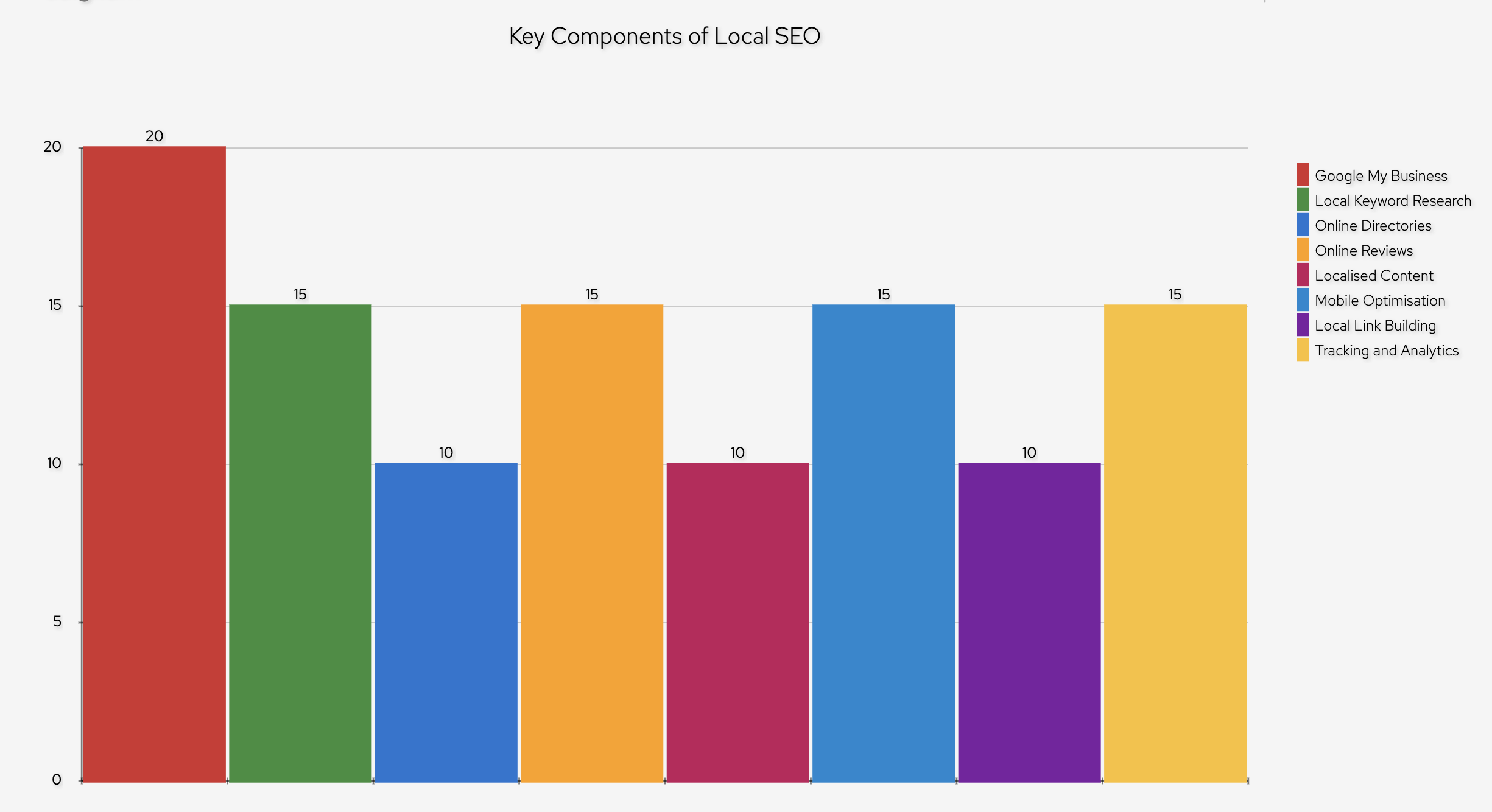
0%

Featured
Featured
The Ultimate Guide to Local SEO: Boosting Your Business with Local Search
5 Min Read
 Local SEO is an indispensable tool for businesses that attract customers within a specific geographical area. By optimising your online presence to rank higher in local search results, you make it easier for potential customers to discover and interact with your business. In this comprehensive guide to local SEO, we will delve into the benefits of local SEO and provide practical tips to enhance your local search visibility and increase foot traffic to your physical location.
Local SEO is an indispensable tool for businesses that attract customers within a specific geographical area. By optimising your online presence to rank higher in local search results, you make it easier for potential customers to discover and interact with your business. In this comprehensive guide to local SEO, we will delve into the benefits of local SEO and provide practical tips to enhance your local search visibility and increase foot traffic to your physical location.
The Significance of Local SEO
Local SEO presents a multitude of benefits for businesses of all sizes. As per Google's data, nearly 46% of all searches are local, indicating that users are actively searching for products or services in their local area1. By tailoring your website and online profiles for local search, you can boost your visibility among local consumers more likely to become customers. Local SEO also aids in establishing trust and credibility by positioning your business as a reliable local resource.Google My Business (GMB)
A pivotal component of local SEO is setting up and optimising your Google My Business listing. GMB is a complimentary tool offered by Google that enables you to manage how your business appears in local search results and Google Maps2. Claim and verify your listing, and provide accurate and current information, such as your business name, address, phone number (NAP), and business hours. Add high-quality images, encourage customer reviews, and regularly update your GMB profile to boost local search visibility.Local Keyword Research
Performing comprehensive local keyword research is crucial for targeting the right audience in your specific area. Utilise keywords research tools like Google Keyword Planner, SEMrush, and Moz to identify relevant keywords with local modifiers3. For instance, if you run a Digital Marketing Agency in Cornwall or London, target keywords like "top Digital Marketing Agency in London" or "Cornish Digital Marketing Agency." Then, integrate these keywords into your website content, meta tags, headings, and image alt texts to optimise for local search.Online Business Directories and Citations
Featuring your business on reputable online directories and citation sites can significantly enhance local SEO efforts4. Ensure consistent NAP information across all platforms, including your website, Google My Business, Yelp, Yell, and industry-specific directories. This consistency signals search engines that your business is legitimate and trustworthy. Aim for high-quality guides with solid domain authority and positive user reviews.Online Reviews and Reputation Management
Positive online reviews play a pivotal role in local SEO and customer trust5. Encourage satisfied customers to leave reviews on platforms like Google, Yelp, and Facebook. Respond to reviews promptly and address any negative feedback to show your commitment to customer satisfaction. Monitoring and managing your online reputation can positively impact local search visibility and customer perception.Localised Content Creation
Creating localised content on your website effectively targets local keywords and engages with your local audience6. Develop blog posts, articles, and resources specific to your location and address the needs and interests of your local community. For example, if you run a Town Planning business in Devon, create content on "Tips to get planning permission in Devon." This helps with local SEO and positions you as a knowledgeable local authority.Mobile Optimisation
Optimising your website for mobile devices is crucial for local SEO success in today's mobile-centric world7. Ensure your website is mobile-friendly, loads quickly, and provides a seamless user experience on smartphones and tablets. Google places a significant emphasis on mobile-friendliness, and a mobile-optimised website can improve your search rankings and attract more local visitors.Local Link Building
Building high-quality backlinks from local sources can boost your local SEO efforts8. Contact local businesses, organisations, and influencers in your community to establish partnerships, collaborations, and guest blogging opportunities. This not only aids in acquiring relevant backlinks but also exposes your business to a wider local audience.Tracking and Analytics
Monitor the performance of your local SEO efforts using tools like Google Analytics and Google Search Console9. Analyse metrics such as organic search traffic, local keyword rankings, click-through, and conversion rates. This data offers valuable insights into the effectiveness of your strategies, enabling you to make data-driven decisions and refine your local SEO campaign for optimal results. This chart represents the key components of a successful local SEO strategy. The data is hypothetical and used for illustrative purposes.
This chart represents the key components of a successful local SEO strategy. The data is hypothetical and used for illustrative purposes.
Conclusion
A well-rounded local SEO strategy can significantly influence your business's visibility, reach, and customer acquisition. By optimising your online presence for local search, you can connect with potential customers in your area, increase foot traffic to your physical location, and gain a competitive edge in the local market. Remember to monitor and refine your local SEO efforts consistently, staying up-to-date with industry best practices and algorithm updates to maintain local search visibility and grow your business.Frequently Asked Questions about Local SEO
What is local SEO, and why is it important?
Local SEO optimises your online presence to rank higher in local search results. It is crucial because it enables businesses to connect with local customers actively searching for products or services in their area. By implementing local SEO strategies, companies can enhance their visibility, attract more foot traffic, and gain a competitive edge in the local market.How do I set up and optimise my Google My Business listing?
To set up your Google My Business (GMB) listing, visit the GMB website and follow the prompts to create an account. Once set up, verify your listing by phone or mail. To optimise your GMB profile, provide accurate and complete information about your business, including your name, address, phone number, business hours, and website URL. Add high-quality images, encourage customer reviews, and regularly update your listing to enhance local search visibility.How do I conduct local keyword research?
Start by brainstorming keywords related to your business and location. Then, use keyword research tools like Google Keyword Planner, SEMrush, or Moz to discover local keywords with high search volume and low competition. Look for keywords that include your location or local modifiers, such as city, neighbourhood, or region. Incorporate these keywords into your website content, meta tags, headings, and image alt texts to optimise for local search.How can online reviews impact my local SEO?
Online reviews play a significant role in local SEO. Positive reviews can improve your business's reputation, trustworthiness, and search rankings. Encourage satisfied customers to leave reviews on platforms like Google, Yelp, and Facebook. Respond to reviews promptly and address any negative feedback to show your commitment to customer satisfaction. Monitoring and managing your online reputation can positively impact local search visibility and customer perception.What is the importance of localised content in local SEO?
Creating localised content on your website helps target local keywords and engage with your local audience. Develop blog posts, articles, and resources addressing your local community's needs, interests, and events. This improves your local search visibility, positions you as a knowledgeable local authority, and increases your chances of attracting local customers.How can I track the performance of my local SEO efforts?
Tools like Google Analytics and Google Search Console provide valuable insights into the performance of your local SEO campaigns. Monitor organic search traffic, local keyword rankings, click-through, and conversion rates. Then, analyse the data to understand which strategies are working and where improvements can be made. This data-driven approach helps you make informed decisions and optimise your local SEO efforts for better results. Local SEO is ongoing; staying updated with the latest industry trends and algorithm changes is essential. Implementing these strategies and continuously refining your approach can boost your local search visibility, attract more local customers, and grow your business.Additional Resources
- Google My Business
- Google Keyword Planner
- Moz Local SEO Learning Center
- SEMrush Local SEO Guide
- Neil Patel's Guide to Local SEO
- Search Engine Journal's Local Search Column
- Search Engine Land's Guide to Local SEO
- BrightLocal's Local SEO Tools

